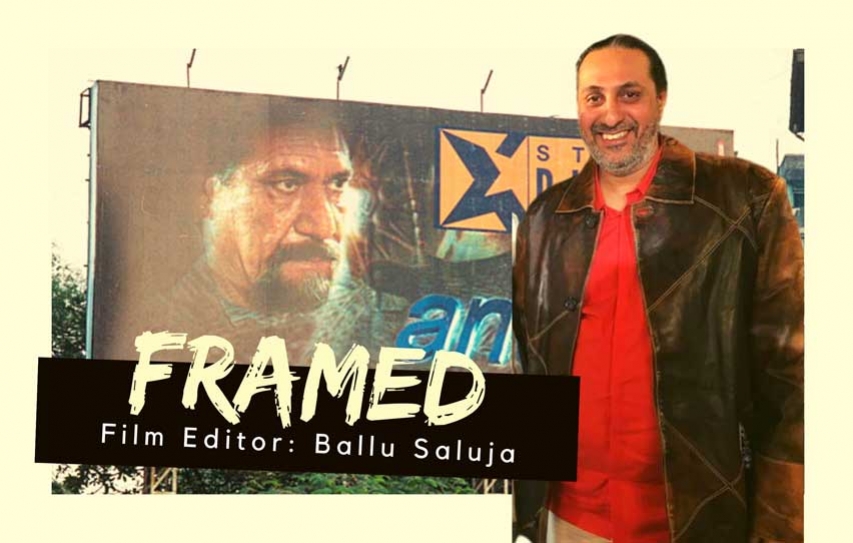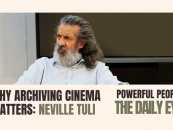
Framed: Film Editor Ballu Saluja
by Aparajita Krishna July 21 2020, 8:31 am Estimated Reading Time: 12 mins, 48 secsAparajita Krishna, writer and filmmaker, profiles the much accomplished editor Ballu Saluja in our first in the series of artistes behind-the-scenes.
Cut to: Lagaan (2001), Pinjar (2003), Swades (2004), Jodhaa Akbar (2008), Dangal (2016), Shaadi Mein Zaroor Aana (2017), Mulk (2018), Paltan (2018), Prassthanam (2019) and Panga (January 2020).
Ballu Saluja, has in his professional experience of nearly two decades, given cut and shape to a line-up of some of the biggest mainstream Hindi films of recent times. As a very established Indian film editor with a noted repertoire of films he has creatively crafted diverse frames and their moods into a cohesive whole.
With Lagaan, no less as his film debut in 2001 he went on to editing films such as the ones mentioned above among others. It was his editing-collaboration with Chinese cinema that saw him specially go global and international. He has been an Academy member of Oscars 2018 and on the Oscar jury committee. Many collaborative international work and talks are in the pipeline with China and the USA.
When I had met him in his office in February 2019, he was scheduled to go to China for the edit of a Chinese film. Now in the present we communicated in a Corona challenged world about his beginnings at work, the present and of a future hereafter.
How do you from today’s gaze see the future of world cinema and specifically of Indian cinema in and post the Corona times? Will on-line release, digital platforms, television premieres be the new normal?
As the situation gets normal Theatre Releases will be back. You cannot beat the Cinematic experience. For on-line platforms there will be many more platforms or Apps coming. For Indian Cinema, till independent producers get a proper release, the situation will be the same. We need to introspect and give equal chance to each and every filmmaker for a good release.
You have your own edit set-ups (MAC Edit) here in Mumbai. You and your assistants edit at Mumbai and have also worked at Beijing. Your first Chinese film was ‘Looking Up’ that came out in 2019. You had gone for the Beijing premiere of this film. The film was released on 18th July 2019. I had seen some of the rushes of the Chinese film you were editing. They were very nice and authentic. The film is a humanist drama, light and serious, revolving around a father-son relationship wherein the father encourages his young son to open his eyes to the world in Looking Up, and making unconventional decisions. There were several other collaborations in the pipeline. Have the 2020 China-India army clashes along the LAC in Galwan Valley, the brutal killing of our soldiers, the Pangong Tso lake issue, the ongoing military standoff, political urgency and expediency changed the work scenario?
The scenario politically has changed, but this also will not last long. For me I have lifelong friends there.
1.jpg)
In the picture above, Ballu Saluja is seen with the team of the film Looking Up, at Peter Jacksons’ mixing studio in New Zealand. He is in the company of directors Deng Chao and Yu Bai Mei and the mixing engineer Michael Hedges and his team. The studio is called The Park Road Post. Michael Hedges is the internationally reputed sound mixing engineer of films such as The Lord of the Rings: The Two Towers (2002), The Lord of the Rings: The Return of the King (2003), King Kong (2005), District 9 (2009), The Hobbit: The Desolation of Smaug (2013) among others. He has won two Oscars/Academy Awards for Best Sound Mixing and nominated for another two in the same category.
Do update me on your other Chinese film projects.
Will definitely let you know when the right time comes.
In the current scenario his reserve in the answer is understandable. There are several foreign collaborations in the pipeline, but the quietest man is Hssssshhhhhhh for now. So, on that note and a hope I revert back to tracing the origin of Ballu Saluja’s work and its trajectory.
A graduate in economics from Punjabi University Patiala (1994), Ballu came into his calling as an editor with actually no formal training in editing from an institute.
He had not planned being an editor. “I just became an editor. My Bhai Saheb (Mumbai based Karan Saluja, a producer/writer/director with the medium of radio, TV and film) ) was already in this line. After my graduation he happened to suggest - Editing kar lo. I did it.”
That beginning was also the earlier years of satellite television programming in India. The editing technology grew in years from nascent technology to state of the art and editor Ballu Saluja’s work grew alongside. Between 1996-2000 he edited many television serials, advertisement films, documentaries, AVs.
“I started by learning Hi-Band, Beta edits. The A-B-C roll process. Learned mostly with Mr. Nitin and Mr. Vivek Tiwari. They were working at Sahara Studios at Goregaon west. I have worked at many studios. At Video Vision, I was a freelancer. It was a transition phase from analog to digital and it helped me to get more work and gain more experience. During analog there were different departments which would work. Then I started with non-linear editing with D-Vision, Radius, Heavyworks. These are names, which very few people are aware of. Only Avid, FCP (Final Cut Pro, video edit tool) we know now. Presently, I only work on Avid. With digital one could do many things. That experience of doing sound, sfx, visual effects all together as an editor helped me to have an edge.”

We recalled our own past collaboration over five docu-feature/fillers for Star-Plus in 1998 and the 39 episode tele-serial Antaraal, that was assigned by Star Plus. Ballu Saluja was the editor. The serial was telecast in 1999 on Star Plus and in 2006 on Star Utsav. It had Om Puri in the main lead with co-actors Joy Sengupta, Arundhati Ganorkar, Aamir Bashir, Mandeep Bhander, Sushma Prakash, Sheeba Chadha, Uttara Baokar, Utkarsh Mazumdar in pivotal roles. Jogi Dayal directed the serial of which I was the producer, co-director. Gulan Kripalani and I co-wrote the story. Preeti M. Dayal/Preeti Mamgain and I co-wrote the screenplay with independent dialogue credit to Preeti M. Dayal. It had camera by Punkaj Prakaash and music by Chintoo Singh.
This was just before Kaun Banega Crorepati, got launched on Star Plus and offloaded the existing programmes. Our man Ballu Saluja had done a very fine and delicate job with the edit. I now also recall with giggles and affectionate nostalgia how back then in time we, as in director Jogi Dayal, assistants Sujata Melmani, Sanjay Shubhankarr and I would sit at the edit with Ballu and demand all our greedy cuts, layers, dissolves etc., from the most genial and giving editor.
In the present, decades away from that work collaboration, he recalled, “The opening montage of Antaraal (in 1999), had around 45 layers and it was liked by everyone at Star Plus. We edited on Avid and thank you for having me and having patience with me.”
My admiration back then for this then even younger and quieter editor had marked that he was almost meditative in his work. The fine detailing came from his inner frames.
Thereafter Ballu Saluja’s work profile saw him edit some more work on television and a film called Aabra Ka Daabra 3D film (2004) that despite reservations in critical appraisal is said to have turned out to be a sleeper, surprise hit.
And then came the big break with the film Lagaan.
Our man recalled, “I had done two pilot episodes for Ashutosh Gowariker -Taxi Taxi and Satarak. So he then thought that I could do the film Lagaan. He gave me the opportunity. I had never imagined to do a film till I did one. I took whatever came across and gathered experience. I thank Aamir Khan and Ashutosh Gowarikar for giving me that opportunity wherein I could showcase my work. Lagaan was very big for me. I was there on the sets just for a week. Aamir is a great human being, a great producer and I thank him for having faith in me. It was Ashutosh Gowariker (the director) who introduced me to Aamir Khan for the project. I am indebted to Ashutosh for having faith in me and giving me a chance. I had confidence in Lagaan from the very beginning. I am thankful to Ashutosh for changing my life by giving me Lagaan, which later was nominated for the Oscars.”

The editor won the Star Screen and the IIFA Award for his work in Lagaan.
Then followed a line-up of very important mainstream Hindi films: Pinjar (2003), Swades (2004), Jodhaa Akbar (2008), What’s Your Raashee? (2009), R…Rajkumar (2013). Each had a big canvas, mounting, star-cast. He got the IIFA Award for Jodhaa Akbar.
These films had very different subjects and would have called for distinct editing visions. The editor informed, “Every film was an add-on for me in my learning experience. Every one taught me something. Some in cinema or some in life.”
This behind the scene man further revealed, “As for acting, I have done a small role in the film Pinjar”.
Dangal (2016) was a film that garnered big domestic and international box-office returns and high creative praise. Dangal was a big hit in China at the box-office and had a record-breaking run. Ballu Saluja got the Star Screen Award for the film. This Dangal (Wrestling Competition) had a quiet, non-confrontational editor who would gently tell this post, “Dangal again gave me in-roads to international films. The door of China opened for me and my first film there happened.”
While Ballu Saluja crossed The Great Wall of China his sure-footedness in India remained. Films that followed in his native land were Shaadi Mein Zaroor Aana (2017), Mulk (2018), Paltan (2018), Prassthanam (2019) and Panga (2020).
Ask him, “Do assess your work in each of these films and which film has most satisfied you?” and the answer is “How can I asses my work? You know me Appy. Every above mentioned film has its unique story and accordingly I tried to live with it. You as a film reviewer or critic can assess it and do let me know what you feel about it. You have worked with me in 1999, you can assess my growth.”
Our man is inherently a very modest, self-effacing and a private person of few words and sthir/settled emotion. So is the tenor of the talk herein. Ironical for here is an editor who has edited some of the longest length feature films that were verbose with grand settings, emotions, drama, songs, action. He is also the editor of the hard hitting Mulk. He sure deserves a lot of footage as an appraisal.

As for the influencers whose works may have taught him, Ballu’s plain and honest reply is, “It’s the Cinema which has taught me. So no particular editor I can name. It is Cinema by itself which has taught me and above all God has blessed me to be where I am today.”
Choosing a favourite film of his own or even that of someone else’s is a daunting and an avoidable question. It is not because he is being diplomatic but because he genuinely does not play favourites with his films. Prodding and persisting with him to name his favourite Indian actors, amongst those who have featured in his work, finally does elicit names. “Aamir Khan, Aishwarya Rai Bachchan, Kangana Ranaut”.
He is one who has internalized the whole process and technique of cinema within him and so his work does the talking. What gets assuredly revealed via his films is the editor’s talent for understanding and connecting with the narratives of diametrically different genres, texts, scenes. Be it a historical, a social, a romance, action, each of the films carry a leitmotif of gentleness and class in approach and pattern of editing.
While his collaboration with Ashutosh Gowariker had remained steadfast he went on to work with noted directors like Chandraprakash Dwevedi, Anubhav Sinha, J.P.Dutta, Ashwiny Iyer Tiwari.
I was curious to find him mentioned as the sound designer of film Paltan (2018). Ballu informed, “There was no sound designer for the film. I had to jump in to save my cut, overlook and decide for sound also.”
He has also produced a Punjabi film Rabba Rabba Meinh Varsa, and will work on its release.
With the advent of digital editing a film editor has become directly responsible for the whole picture. He/she is no longer just a picture editor, but also has to be very well versed in other areas of filmmaking: picture, sound, music, visual effects. Those that were earlier on, strictly speaking, not his/her personal domain and more demarcated have to now be overseen by a film editor.
An editor like Ballu Saluja effectively works with layers of images, performances, dialogue, sound, music, pacing, special effects to communicate the film from a written word to its on-screen avataar. He firmly believes that, “Editing is an extension of the screenplay. An editor has to grasp the flow of the story”

As for his creative plans for the future as a director, producer, our man would rather share it when that appropriate future comes. “Not now”.
While summarizing the talk and his vocation I said, “Film editing is also referred to as an invisible art. Because to a lay audience it is invisible. Acting, direction, camera, music etc are more overt. Do you think so? How would you define editing to a student?”
The quiet Ballu Saluja’s love for his craft now emphatically said, “Yes, editing is invisible. After computers came in everyone who could operate one became an editor. I don’t think the respect editing should get is given in India. I was surprised when I first met Michael Hedges (world renowned, Oscar winning Mixing Engineer) for the mixing of my Chinese film Looking Up, and he said - thank you for keeping space for sound. I was overwhelmed. An Oscar winning technician appreciating my work. Editing is creating emotions, taking the audience along with the story, making them laugh, cry, feel for characters. Anyone doing editing has to feel the story and create emotions so that the audience gets in the film and is mesmerized with the story.”
His own story of life predominantly features his wife Rajdeep Saluja and sons Angad Saluja and Yuvraj Saluja.
As Ballu Saluja signs off from this page he along with his world and the larger world await the cutting off, the editing out of the corona times from our collective life and from the world of cinema. Who knows in some future he would be editing or directing a film that tells the tale of Love in the Time of Corona.





-173X130.jpg)
-173X130.jpg)
-173X130.jpg)
-173X130.jpg)
-173X130.jpg)

